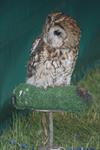A must for anyone wanting to work or volunteer to work with wildlife!
-
 Learn more about wildlife management, wildlife conservation, vertebrate zoology and much more!
Learn more about wildlife management, wildlife conservation, vertebrate zoology and much more!
- Understand animal anatomy, physiology, behaviour and psychology.
- Study wildlife ecology, habitats, animal populations, ecological systems and more.
- Choose from a large range of elective modules to tailor the course to your areas of interest.
There has never been a better time to work with wildlife!
With a generation of wildlife professionals retiring, and a number of worldly trends now impacting our wildlife more than ever, now is the time to train as a wildlife professional.
Imagine working in a diverse and rapidly evolving profession which affords opportunity for intellectual challenge, travel and interesting coworkers, while allowing you to work outdoors, amidst nature and a variety of irreplaceable species.
Train for a professional career in working with wildlife.
Course Structure and Content
Course Duration: 1500 hours of self-paced study. Start at any time, study where and when you want.
This course requires you to complete 10 core modules. You can then choose five elective modules, to hone your studies towards areas of wildlife that interest you.
Click on the module titles below to learn more about each.
Core Modules
 Animal Anatomy And Physiology (Animal Husbandry I ) BAG101
Animal Anatomy And Physiology (Animal Husbandry I ) BAG101
Freelance Writing BWR102
Marine Studies I BEN103
Ornithology BEN102
Vertebrate Zoology BEN104
Wildlife Conservation BEN206
Wildlife Management BEN205
Zoo Keeping BEN208
Environmental Assessment BEN301
Industry Project BIP000
Elective Modules
Students are to select and complete five of the elective modules from the choices below -
Each module in the Associate Diploma in Wildlife Management is a short course in its own right and may be studied separately.
%202005johnJuly%20Currumbin%20SanctuaryGreek%20058.jpg)
What's it like working with wildlife?
Working in wildlife education and interpretation can be a very rewarding and inspiring career choice.
People working with wildlife will often say they love their job even though parts of it may be physically demanding and sometimes dirty work. Being in contact with wildlife and having the opportunity to educate others on the conservation importance of these animals is for some people a dream job.
Can captive wildlife be trained?
Training animals in captive environments implies experience and knowledge of proper handling and animal welfare, as well as special training skills and cognition or understanding of animal psychology.
Captive animals may exhibit abnormal behaviour or different to that displayed naturally in the wild due to enclosure, social deprivation or even changes in their feeding habits. It is important, therefore, that the trainer is completely aware of each animals’ natural needs and that it is receiving adequate care, nurture, stimulation and discipline.
Good discipline and training can create bond and communication between the animal and its trainer, which, in turn, can lead to the animals' well-being and happiness within the enclosure, as well as during health procedures that the animal might normally reject.
Some animals, however, are easier to be trained than others, whereas others might not have the ability to understand and obey commands, but might have more reasons to be trained. Dolphins, for example, are an excellent example of all the points noted above. Dolphins are natural long distance and fast swimmers, requiring a large open ocean space in order to maintain a healthy lifestyle in terms of physical body needs, feeding and reproductive habits, and psychological development. Therefore, these characteristics may reflect abnormal behaviour if kept in a confined facility, however, dolphins have shown to adapt and perform with joy and motivation to each command a human trainer expects and implies if training and husbandry is properly attained.
Why Study with ACS?
Design your own learning pathway.
Study at your own pace, from anywhere, at any time.
Receive prompt, expert support from our team of committed and friendly tutors.
Your learning is our priority. We are flexible and adaptable to meet your educational needs!
This is an experiential learning-based course. Throughout your studies you will have the opportunity to network with and learn from a variety of industry professionals. Establishing real-world relationships and confidence is key to career success.
Enrolling is easy - just go to the top of this page and select your study method and payment option.
If you have any questions about studying with ACS, or want to know more about any of our courses, get in touch with our specialist tutors today.
They will be happy to answer your questions and look at different study options to fit in with your goals.